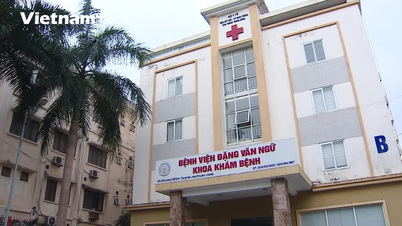Tet is approaching, this is an occasion for people to gather, travel and participate in group activities. However, Tet is also the time when respiratory diseases, especially influenza, are at risk of outbreak.
Seasonal flu is raging around the world , how does Vietnam prevent it?
Tet is approaching, this is an occasion for people to gather, travel and participate in group activities. However, Tet is also the time when respiratory diseases, especially influenza, are at risk of outbreak.
Risk of flu outbreak during Tet holiday
Around the world, countries such as the United States, China, India and European countries are facing severe flu outbreaks. Hospitals are facing overload, while vaccination remains the main preventive measure to prevent the spread of the virus.
According to the latest report, Vietnam has recorded several deaths due to influenza A/H1N1pdm in Binh Dinh province. The Ministry of Health has directed medical facilities to strengthen infection control measures, proactively monitor and promptly intervene to prevent deaths. In addition, one case of influenza A(H9N2) infection in humans has been recorded.
This case occurred in an adult with underlying medical conditions who required hospitalization and monitoring. In addition, H5N1 avian influenza has also appeared in Khanh Hoa province, with a 21-year-old male student dying from the infection. These cases show the need for vigilance and proactive influenza prevention, especially during Tet.
[embed]https://www.youtube.com/watch?v=Or-EHErT_-c[/embed]
The U.S. Centers for Disease Control and Prevention (CDC) is working with the Vietnamese Ministry of Health and other partners to build effective public health systems, including influenza surveillance and prevention.
This international collaboration has been instrumental in enhancing Vietnam’s public health capacity and responding to disease outbreaks. To monitor influenza in both humans and animals, Vietnam has implemented influenza surveillance at live poultry markets and pig farms in the North.
This method involves collecting oral secretion samples from poultry and pigs, bioaerosol and fecal samples from livestock facilities, and nasal washes from workers at these sites for testing and analysis.
The Ministry of Health recommends that people get an annual flu vaccine and practice good personal hygiene to prevent influenza. People should also stay home when sick and seek medical attention immediately if they experience symptoms such as high fever, persistent cough, difficulty breathing, chest pain, fatigue and body aches.
In particular, people traveling to countries with avian influenza outbreaks should avoid contact with animals in live animal markets or areas where animals may be slaughtered.
According to the World Health Organization (WHO), seasonal influenza is an acute respiratory infection caused by influenza viruses, which circulate worldwide. Influenza viruses typically cause symptoms such as fever, cough (usually dry), headache, muscle and joint pain, fatigue, sore throat and runny nose.
In Vietnam, according to the Ministry of Health, influenza A and influenza B are the two most common types of influenza. This study also noted that influenza circulates year-round, with peaks alternating between different strains and subtypes.
In addition, avian influenza is a particular concern during Tet when demand for poultry increases. People need to be careful when selecting and processing poultry to ensure food safety and hygiene.
According to statistics from the Ministry of Health, the number of flu cases often increases dramatically during the Lunar New Year. The main reason is the erratic weather: The North often experiences cold spells alternating with warm sunshine, while the South has sudden changes in temperature between day and night, creating favorable conditions for the flu virus to develop.
Crowded gatherings: Shopping, spring outings, and visiting relatives create opportunities for the flu virus to spread rapidly.
Changing living habits: During Tet, many people stay up late, eat irregularly, which reduces resistance and creates conditions for infectious diseases.
Common types of seasonal flu to watch out for
Common types of flu during Tet 2025 include seasonal flu: Caused by influenza viruses type A and B, seasonal flu usually appears in winter-spring with symptoms such as high fever, headache, sore throat and fatigue.
Influenza A/H1N1: This is a variant of influenza A virus that has become a major concern as new strains appear. Initial symptoms are similar to seasonal flu but can become severe quickly, especially in the elderly and young children.
Influenza A/H5N1: The H5N1 avian influenza virus is very dangerous, with a high mortality rate. Although rare in humans, when infected, influenza A/H5N1 can cause serious respiratory complications.
Influenza B: Influenza B is usually milder than influenza A but still requires careful monitoring. Influenza B viruses mutate less, but can still cause small-scale outbreaks.
New Covid-19 variants: Although no longer a pandemic, Covid-19 continues to appear with new variants. Experts predict that a new variant may appear during Tet 2025, requiring people to remain vigilant.
Regarding signs of flu according to medical experts, seasonal flu: Fever from 38-39°C, sore throat, fatigue. Incubation period from 1-4 days.
Influenza A/H1N1: High fever above 39°C, dry cough, difficulty breathing, possibly accompanied by diarrhea. Incubation period from 3-7 days. Influenza A/H5N1: Very high fever, severe difficulty breathing, chest pain. Incubation period from 2-5 days. Covid-19: Fever, dry cough, loss of smell and taste. Incubation period from 2-14 days.
Vaccination is the most important measure
To prevent seasonal flu, according to Dr. Nguyen Tuan Hai, Safpo/Potec Vaccination System, annual flu vaccination is the most effective preventive measure. The quadrivalent flu vaccine protects against four common strains of influenza virus.
WHO has long established seasonal influenza virus monitoring stations around the world (including in Vietnam) to isolate and identify seasonal influenza viruses circulating in regions (geographical regions, climates, Northern and Southern hemispheres, etc.).
From there, predict and determine the influenza virus strain that will appear in the winter-spring season in the Northern Hemisphere (from October to the end of April next year) and in the winter-spring season in the Southern Hemisphere (from May to October every year).
From determining which influenza virus strains are likely to prevail where (Northern and Southern Hemispheres), WHO will provide guidelines on influenza virus strains for the production of seasonal influenza vaccines for vaccine manufacturers to follow and supply to the market at the best time (Northern Hemisphere is around August-September, and Southern Hemisphere is around April-May every year).
That is why we living in Vietnam need to get a seasonal flu vaccine once a year and before the flu season starts, as well as getting the recommended seasonal vaccine.
Because Vietnam is located in the tropical monsoon region, the flu season in the North and the South may differ slightly in time, but because it is located entirely in the Northern Hemisphere and according to WHO recommendations, it is advisable to get the correct Northern Hemisphere seasonal vaccine, which covers from this winter to the end of next spring. That means, to prevent seasonal flu, everyone should get vaccinated in the fall.
Regarding the question of whether the flu vaccine is only given to children or adults, according to Dr. Nguyen Tuan Hai, both adults and children need to get the seasonal flu vaccine to protect their health.
In addition, people need to practice good personal hygiene: Wash hands regularly with soap, cover mouth when coughing or sneezing, and avoid close contact with sick people.
Stay healthy: Eat nutritious food, exercise and get enough sleep to boost your immune system. Rest: Rest helps your body recover quickly.
Drink plenty of fluids: Drink water, juice and warm soups to avoid dehydration. Pain and fever relief: Use paracetamol or ibuprofen to reduce fever and headaches.
Antiviral drugs: Used in cases of severe infection or high risk of complications.
What are the differences in symptoms between these types of flu? They have similar symptoms, but influenza A/H1N1 can cause serious complications, while hMPV usually causes respiratory illnesses such as colds and pneumonia.
How to tell the difference between the flu and the common cold? The flu usually starts suddenly and has more severe symptoms, while a cold usually has mild symptoms such as a runny nose and sneezing.
What should people do to prevent flu during Tet? Get a flu vaccine, practice good personal hygiene, and stay healthy through proper diet and rest.
When to see a doctor: If you have severe flu symptoms or are in a high-risk group (children, the elderly, pregnant women, or people with underlying health conditions), see a doctor immediately if you have seasonal flu.
Source: https://baodautu.vn/cum-mua-dang-hoanh-hanh-tren-the-gioi-viet-nam-phong-chong-the-nao-d242090.html



![[Photo] President Luong Cuong receives Prime Minister of the Kingdom of Thailand Paetongtarn Shinawatra](https://vphoto.vietnam.vn/thumb/1200x675/vietnam/resource/IMAGE/2025/5/16/52c73b27198a4e12bd6a903d1c218846)
![[Photo] Prime Minister Pham Minh Chinh and Prime Minister of the Kingdom of Thailand Paetongtarn Shinawatra attend the Vietnam-Thailand Business Forum 2025](https://vphoto.vietnam.vn/thumb/1200x675/vietnam/resource/IMAGE/2025/5/16/1cdfce54d25c48a68ae6fb9204f2171a)






























































































Comment (0)